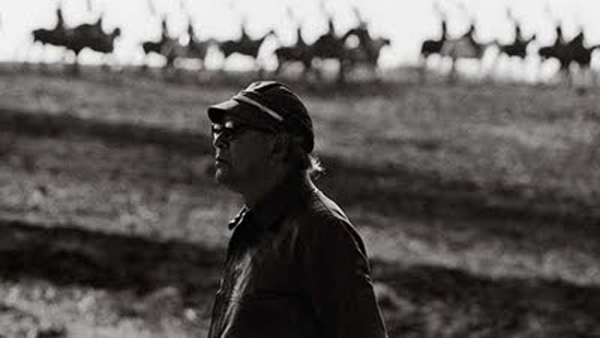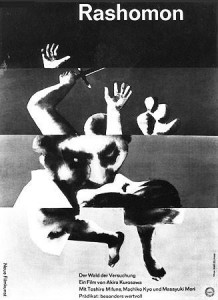
It must be a frustrating thing to sit on the rights to the filmography of one of the greatest filmmakers who ever lived, knowing that there’s money to be made directly proportional to how willing you are to defile his legacy and prostitute the rights to his films and unwritten screenplays. The Akira Kurosawa 100 Project, led by Hideoyoshi Kato, is an organization that has been experiencing exactly that, and they have know decided (right after the centennial anniversary of the director’s birth) to open the floodgates with one fell swoop, partnering with Splendent Media who will “represent” the rights to Kurosawa’s work outside of Japan.
This means there is an active curator that will be negotiating remake rights for the 26 movies directed by Kurosawa, the 24 he wrote but were directed by others, and the 19 screenplays he never shot. Before you assume that we’re simply jumping to the most cynical conclusion about an innocuous deal that would, say, just have Criterion dealing with a new company for publishing the films, know that remakes are a core concern of the deal.
“In recent years, countless American and European filmmakers have expressed intense interest in remaking Kurosawa’s films,” Kato said. “To help streamline this process, we are extremely pleased to have found in Ms. Yamada a representative who possesses a deep passion for Kurosawa’s work as well as strong connections to both the Japanese and U.S. entertainment industries.”
There are four properties that are already involved in studio deals elsewhere, and these are not a part of this awarded pimpmanship to Splendent. You may remember that Seven Samurai has long been developing as a remake with the Weinsteins (and it’s been remade a dozen times before without the name), along with High and Low, Ikiru, and Drunken Angel.
 Now that I’ve belched out the immediate bile and cynicism that surfaces with news like this, let’s be real for a second. There’s no good reason that the rights to Kurosawa’s work shouldn’t be up for negotiation, and that these stories shouldn’t be available to filmmakers around the world. We all know Hollywood is cheap enough to try and cash in on whatever nebulous brand value something like Seven Samurai or Rashomon would theoretically have, but this is not the same as Milton-Bradley’s board game stable going up for sale or something. There are dozen of classic stories here, the kind that could be reinterpreted in any number of interesting and worthwhile ways, either by updating them, setting them in a new context, or reinterpreting their core themes. Ultimately this is a high value collection of rights because of the quality of the stories at the core of them, not because it’s a bunch of brand names to be exploited.
Now that I’ve belched out the immediate bile and cynicism that surfaces with news like this, let’s be real for a second. There’s no good reason that the rights to Kurosawa’s work shouldn’t be up for negotiation, and that these stories shouldn’t be available to filmmakers around the world. We all know Hollywood is cheap enough to try and cash in on whatever nebulous brand value something like Seven Samurai or Rashomon would theoretically have, but this is not the same as Milton-Bradley’s board game stable going up for sale or something. There are dozen of classic stories here, the kind that could be reinterpreted in any number of interesting and worthwhile ways, either by updating them, setting them in a new context, or reinterpreting their core themes. Ultimately this is a high value collection of rights because of the quality of the stories at the core of them, not because it’s a bunch of brand names to be exploited.
I can’t say I’m excited that it’s easier to get a hold of the rights as they weren’t exactly impossible to acquire before, and one would hope that it would take genuine energy and passion for a producer or filmmaker to go after and get them. Regardless, there’s potentially a silver lining to this cloud, even if it’s hard to see the good in an opportunity for more remakes in this day and age.
We’ll see what happens, but let us know what you think. I’ve listed the films in their varying categories below (found on Splendent’s website), so check that out and then…
Twitter, comments, or boards — take to them!
Source | Variety
Kurosawa’s Films:
Sanshiro Sugata – 1943
The Most Beautiful – 1944
Sanshiro Sugata Part2 – 1945
The Men who Tread on the Tiger’s Tail – 1945
No regrets For Our Youth – 1946
One Wonderful Sunday – 1947
The Quiet Duel – 1949
Stray Dog – 1949
Scandal – 1950
Rashomon – 1950
Idiot – 1951
Record of a Living Being – 1955
Throne of Blood – 1957
The Lower Depths – 1957
The Hidden Fortress – 1958
The Bad Sleep Well – 1960
Yojimbo – 1961
Sanjuro – 1962
Red Beard – 1965
Dodes’Ka- Den – 1970
Dersu Uzala – 1975
Kagemusha – 1980
Ran – 1985
Dreams – 1990
Rhapsody in August – 1991
Madadayo – 1993
Films Written, But Not Directed By Kurosawa:
Currents of Youth (Seishun No Kiryu) – 1942
A Triumph of Wings (Tsubasa no Gaika) – 1942
Wrestling Ring Festival (Dohyosai) – 1944
Brava Tasuke Isshin! (Appare Isshin Tasuke) – 1945
Four Love Stories (Yottsu No Koi No Monogatari [segment “Hatsukoi”]) – 1947
Snow Trail (Ginrei No Hate) – 1947
The Portrait (Shozo) – 1948
Lady from Hell (Jigoku no Kifujin) – 1949
Jakoman and Tetsu (Jakoman to Tetsu) – 1949
Desertion at Dawn (Akatsuki No Dasso) – 1950
Jiruba Tetsu – 1950
Fencing Master (Tateshi Danpei) – 1950
Beyond Love and Hate (Ai To Nikushimi No Kanata E) – 1951
The Den of Beasts (Kedamono No Yado) – 1951
Vendetta of a Samurai (Araki Mataemon: Kettô Kagiya no Tsuji) – 1952
Sword For Hire (Sengoku Burai)- 1952
Blow! Spring Wind (Fukeyo Haru Kaze) – 1953
Vanished Enlisted Man (Kieta Chutai) – 1955
Hiba Arborvitae Story (Asunaro Monogatari) – 1955
Advance Patrol (Nichiro sensô shôri no hishi: Tekichû ôdan sanbyaku-ri) – 1955
Saga of the Vagabonds (Sengoku Gunto-Den) – 1959
Alley Cat (Dora-Heita) – 2000
After the Rain (Ame Agaru) – 1999
The Sea is Watching (Umi wa Miteita) – 2002
Unproduced Screenplays by Akira Kurosawa:
Mizuno Jyuro Zaemon – 1938
The German Of Darumaji – 1941
Shizuka Nari – 1942
Yuki – 1942
Mori no Sen Ichiya – 1942
Utsukushiki Koyomi – 1942
Sampagita No Hana – 1942
Dai San Hatoba – 1942
Jajauma Monogatari – 1944
Dokkoi Kono Yari – 1945
The People Of Kan-Oke-Maru – 1951 (Synopsis coming soon)
Ezo Tanken Ki – 1951
Hibi Heian – 1958
Aka Oni -1966
Soshite – 1966 (Synopsis coming soon)
Runaway Train (Boso Kikansha) – 1966
Kaachan – 1969
Si No Ie No Kiroku – 1977
Black Masque of the Death – 1977